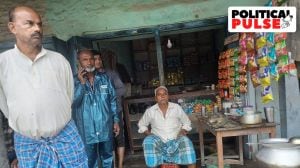Ahmedabad International
Having tiptoed around the Nazis when they walked all over Switzerland before the Second World War, Swiss Foreign Minister Joseph Deiss knew ...

Having tiptoed around the Nazis when they walked all over Switzerland before the Second World War, Swiss Foreign Minister Joseph Deiss knew his country had to play it differently this time.
On the evening before he called on Prime Minister Vajpayee early last week, Deiss met a number of people from Gujarat.
The stories they related were similar only the details differed, terrible details about women and children being raped and then burnt alive. How could Switzerland, infamous for its neutrality, remain silent, these people wanted to know.
So when Deiss went to meet Vajpayee the next day, his mind was made up. He was going to express his concern, again, over Gujarat. Never mind the snub. He had also decided that he would drop plans to visit Swiss aid projects in Narendra Modi’s state, for fear that it would be used to legitimise the Gujarat government.
As the world crashed around India in the space of one week, emotions of shame, humiliation, anger had to be battled in the corridors of the Ministry of External Affairs (MEA).
Officials who would have otherwise been preparing strategies to reinvigorate the worldwide coalition against terrorism, have been reduced to fighting rearguard action against one word — Gujarat — with its attendant visions of carnage. Gujarat had insinuated itself so thoroughly into the very heart of foreign policy.
Once upon a time, an aeon ago, when India went nuclear in mid-1998, the MEA had taken on the world for daring to toss out an outdated nuclear regime from the discriminatory annals of international policy.
Those years, when the MEA burnt the midnight oil in its attempts to show that India was a stable, secular, democratic state, now seem like a dream. Values like ‘‘democracy’’ and ‘‘secularism’’ were not the prerogative of the West, India had declared, these were core Indian values. And this January — before Gujarat put India on to another planet — Fareed Zakaria, former editor of the prestigious Foreign Affairs and presently with Newsweek, had spoken of India standing tall in an ‘‘arc of instability’’ that connected Pakistan, Afghanistan and Iraq.
Today, as the world examines India’s human rights record in the wake of Gujarat, the tensions are only just surfacing in the MEA. Principal Secretary Brajesh Mishra, himself a former IFS officer, has been keeping a low profile. Diplomats and Indians who say they know Jaswant Singh well, are still giving him the benefit of the doubt, but only just. Remember Singh’s lines about Kashmir being the ‘‘core of India’s nationhood’’ as he mocked Pervez Musharraf on the eve of Agra, these people point out. How does that square with Gujarat?
Neither is the MEA argument that Gujarat is an ‘‘internal matter’’ likely to wash. Foreign policy commentator and former high commissioner to Pakistan, G. Parthasarathy, points out that in a globalised world we cannot afford to dismiss criticism on human rights. Says he,‘‘Even on Kashmir it was a mixed bag, with human rights violations and terrorism. But when your own media and other institutions are accusing you of targetting Muslims, how can you accuse the world of interfering?’’
Clearly, the worst flak is yet to come. With important European Union leaders like Javier Solana and Chris Patten expected in early May, the Europeans are gearing up to quietly tell New Delhi that Gujarat is not on, that it can hurt them badly on other issues. Some governments with large aid projects in Gujarat, who otherwise have to go through the finance ministry, may now think of getting Foreign Contribution Regulation Act clearances so that they can directly fund projects. Others are wondering what to do with rehabilitation packages intended for the earthquake victims, since a large number of Muslims have now been eliminated altogether.
Meanwhile, other initiatives are said to be in the pipeline by independent parties, such as those in Britain, even though the British foreign office has denied it will give any such support to families who have lost relatives in the Gujarat carnage. These families could, some say, invoke the infamous Indian Prevention of Terrorism Act (POTA) and ask for Modi’s extradition, since POTA has a clause that allows for the extradition of terrorists. The Belgian court, which has indicted Ariel Sharon for his crimes against Palestine, could well take up the Modi case under a public interest litigation.
And even though neither India nor the US are members of the International Criminal Court (ICC), which waits for its 60th signatory in June to come alive in The Hague, New Delhi must be warned that unless it does more than send clarifications of the PM’s speech in Goa to the rest of the world, things will not die down.
Putting Modi in the hot seat beside Slobodan Milosevic may be a far cry yet, but the government should not kid itself. Human rights without frontiers may yet become the new mantra of a people who had thus far supported the BJP government on Kargil, on talking tough to Pakistan, and almost every other foreign policy issue. For the MEA, it promises to be a long, gruelling summer ahead.



- 01
- 02
- 03
- 04
- 05




























